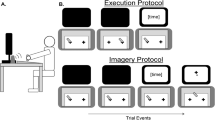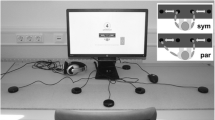Abstract
Several experiments have suggested that similar physiological substrates are involved in movement execution and motor imagery, and that the same laws of movement control apply to both processes. Using a mental chronometry paradigm, we examined the effects of movement direction and added mass on the duration of actual and imagined movements. Six subjects executed or imagined arm movements in the sagittal and horizontal plane, in three different loading conditions: without added mass, and with an added mass of 1 and 1.5 kg. The duration of both actual and imagined movements was measured by an electronic stopwatch. The actual movements were significantly increased in duration as a function of mass, for both movement directions. However, direction per se had no effect on duration. The duration of imagined movements was very similar to that of actual movements whatever the subject and mass and direction condition. These results show that both inertial and gravitational constraints are accurately incorporated in the timing of the motor imagery process, which appears therefore to be functionally very close to the process of planning and performing the actual movement.
Similar content being viewed by others
Author information
Authors and Affiliations
Corresponding author
Rights and permissions
About this article
Cite this article
Papaxanthis, C., Schieppati, M., Gentili, R. et al. Imagined and actual arm movements have similar durations when performed under different conditions of direction and mass. Exp Brain Res 143, 447–452 (2002). https://doi.org/10.1007/s00221-002-1012-1
Received:
Accepted:
Published:
Issue Date:
DOI: https://doi.org/10.1007/s00221-002-1012-1




